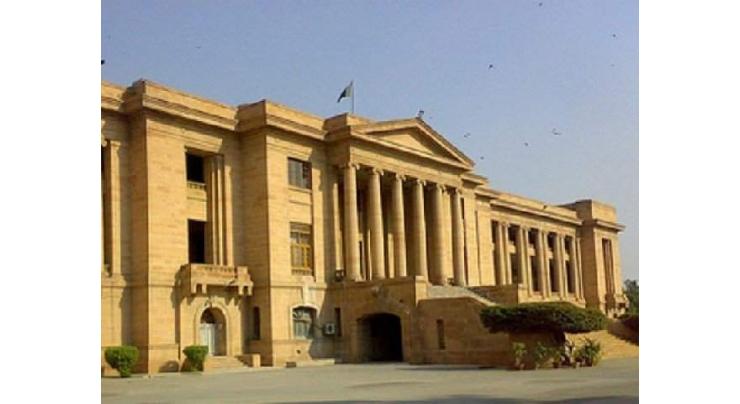
- Home
- Pakistan
- News
- Sindh High Court rules observance of 90- days Iddat for non-Muslim woman remarrying a Muslim man
Sindh High Court Rules Observance Of 90- Days Iddat For Non-Muslim Woman Remarrying A Muslim Man
Faizan Hashmi Published October 01, 2022 | 12:08 AM

The Sindh High Court has ruled that observance of 90-day iddat for a non-Mulim woman remarrying a Muslim man is indispensable while a family court has to issue a decree as well for dissolution of marriage between a non-Muslim couple
HYDERABAD, (UrduPoint / Pakistan Point News - 30th Sep, 2022 ) :The Sindh High Court has ruled that observance of 90-day iddat for a non-Mulim woman remarrying a Muslim man is indispensable while a family court has to issue a decree as well for dissolution of marriage between a non-Muslim couple.
The Hyderabad Circuit Bench on Friday also ruled that a converting woman was under obligation to invite her non-Muslim husband to embrace islam and to wait for his reply during the period of iddat.
The order was given in a petition filed by Lalu Tamachi whose wife Nagina, who gave birth to his 4 children, converted to Islam and married with Mazhar Hussain Khan.
"Iddat is necessary after dissolution of marriage of any character," the bench ruled as stated in the order.
The order explained that one of the reasons for observing iddat was to offer an opportunity to non-Muslim husband of a converted woman to accept Islam.
The second reason was to check if the woman became pregnant from ex-husband during the period of 90-days.
"If the husband in response to the offer embraces Islam within the period of iddat, the marriage shall continue," the order said.
"But if he remains non-Muslim even after expiry of iddat the family court may pass a decree of termination of the marriage," it added.
The bench directed that the woman who was changing the religion should also file a petition in the family court which would summon her husband to give him the opportunity to change the religion as well.
However, if her husband wanted to remain non-Mulsim the court could decree termination of marriage but after completion of the period of iddat.
The bench gave references of the past judgments of the apex court and Lahore High Court in identical cases and pointed out that the observance of iddat and inviting husband to the fold of Islam were declared necessary in those orders.
The bench directed the SHC's registrar to send the order in question to the judges of all the district and civil courts in addition to sending it to the Sindh cabinet through the Secretary Sindh Assembly.
The SHC had appointed Razia Ali Zaman Khan, Sajjad Ahmed Chandio and Ishrat Ali Lohar as the amicus curiae to assist the court.
Meanwhile, with regard to Tamachi's petition the bench noted that Nagina left house of her husband on January 15, 2022, and two days later on January 17 she became a Muslim and renamed herself as Murk.
The SHC underlined that there was no evidence to suggest that she had told her ex husband about her plan for the conversion or invited him to follow her suit as well.
"There is no evidence that she ever happened to meet with the petitioner and made him her offer (to accept Islam)," the order stated, adding that the woman also did not observe iddat.
The bench observed Murk failed to follow all the procedures laid down in the law.
However, the court also noted that the LHC's order and opinion of the amicus curiae of the LHC had not declared any criminal liability in such cases and had rather offered the solution through a fresh nikkah after completion of iddat.
The bench stated that though the Sindh assembly had taken the first step by legislating the Hindu Marriage Act, 2018, many questions still remain unanswered which require further legislation.
Related Topics
Recent Stories

Usain Bolt named ICC Men’s T20 World Cup 2024 Ambassador

PM visits martyred Customs official's residence in Abbottabad

Punjab CM Maryam faces legal case for wearing police uniform

PTDC plans to organize two-day tourism expo

COP29 host says deal on climate aid essential but offers few details

SC orders end of encroachments in Karachi

Nazish Jahangir denies viral screenshots, calls them fake

Govt likely to hike electricity price once again

Bismah Maroof announces immediate retirement from international cricket

Malala expresses unwavering support for Gaza people

Selection committee dissolved over Pakistan women cricket team's poor performanc ..

Punjab CM Maryam Nawaz in police uniform at Chung police center
More Stories From Pakistan
-

PM visits martyred Customs official's residence in Abbottabad
10 minutes ago -

Punjab CM Maryam faces legal case for wearing police uniform
21 minutes ago -

PTDC plans to organize two-day tourism expo
13 minutes ago -
Akhunzada calls for Provincial Assembly session to devise policy against terrorism
27 minutes ago -
Commissioner for better traffic management
27 minutes ago -
VC SMIU addresses prize distribution ceremony of University's Model School
27 minutes ago
-
KP Assembly speaker vows to run assembly affairs indiscriminately
37 minutes ago -
AJK Police crack-down on VIP culture
37 minutes ago -
Ex. Secretary SCCI strongly rebuts allegation of corruption, blames president of character assassina ..
37 minutes ago -
Minister launches special 'Meat Safety Task Force' in PFA
37 minutes ago -
Murder suspect apprehended in Attock
47 minutes ago -
Attock police foil narcotics smuggling attempt
47 minutes ago


